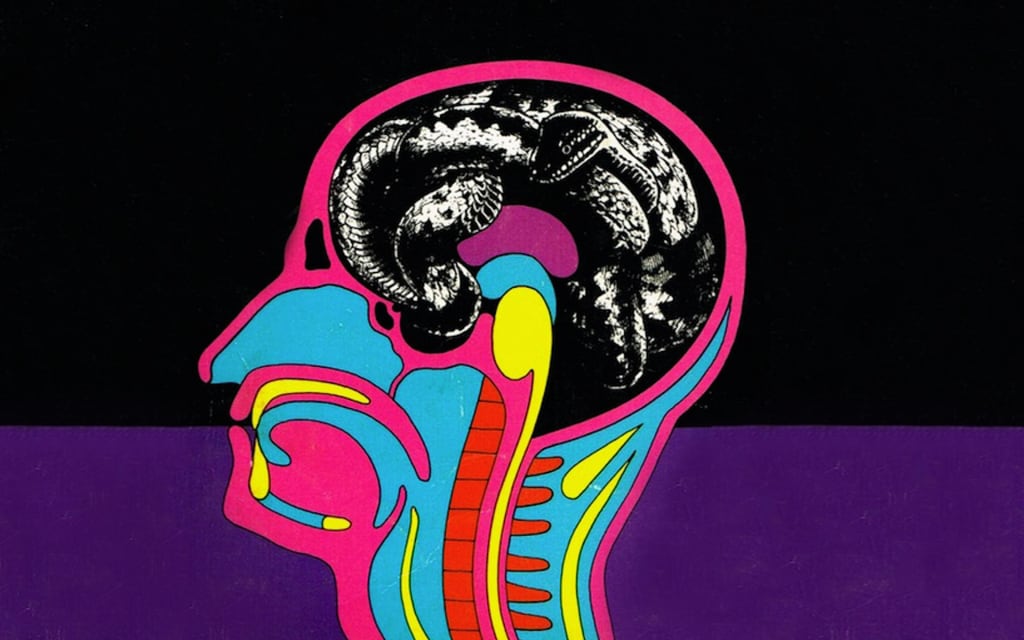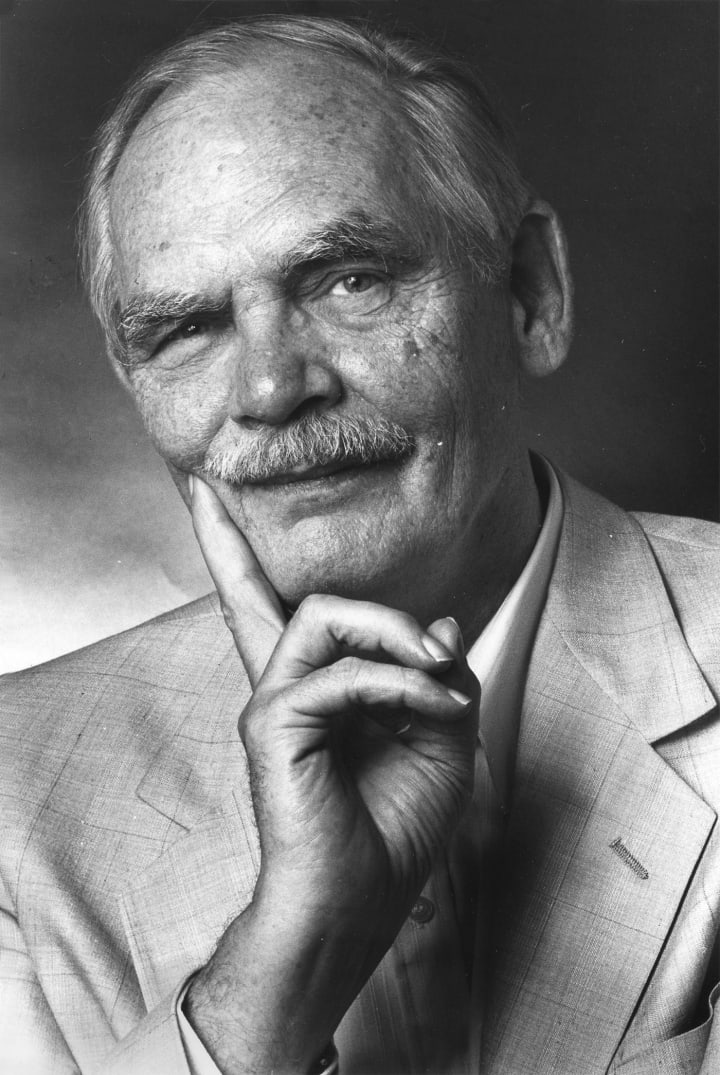Science Fiction Author Frederik Pohl
Without Frederik Pohl, what would have happened to science fiction?

Pohl’s early career unfolded over the background of the Great Depression and the Second World War, a climate of unimaginable fear and uncertainty. This was the so-called "Golden Age" of science fiction, the years of John W. Campbell's catalytic editorship of Astounding Science Fiction, when pulp publishing was slowly metamorphosing into a defined genre, an era when its practitioners hadn’t yet begun to comment on the gloomy aspects of progress. To Pohl’s generation, science represented the potential for escape from the disaster of economic failure and war. No one was looking for a downside; they only saw the virgin capacities of uncolonized planets, and dreamt of a people united in the betterment of the species through new technology. “In those early days,” Pohl writes in his lovely collection of short stories, The Early Pohl, “we were as innocent as physicists, popes and presidents. We saw only the promise, not the threat.”
Of the golden years, Pohl wrote further:

Science fiction was purely a pulp category in those days…I learned how to invent ray-guns and how to make a story march, but it was not for a long, long time that I began to try to learn how to use a story to say something that needed saying. In fact, when I look back at the science-fiction magazines of the twenties and early thirties, the ones that hooked me on sf, I sometimes wonder just what it was we all found in them to shape our lives around. I think there were two things. One is that science fiction was a way out of a bad place; the other, that it was a window on a better one.
Beginning with his first published work, a little poem called Elegy For a Dead Planet: Luna that ran in a 1937 issue of Amazing Stories when he was just a teenager, Pohl's career spanned nearly 75 years and earned him a mantelpiece full of Hugo and Nebula Awards. He was a gifted editor as well as a writer: he helmed the important science fiction magazines Galaxy and If, and edited some of the most innovative and literary novels in science fiction history, including two of my favorites ever: Joanna Russ' The Female Man and Samuel Delany's difficult and miraculous Dhalgren.
He was also, significantly, a die-hard fan. He edited two different science fiction magazines and headed up local fanclub chapters before he was twenty. The Early Pohl is full of adorable details about what it was like to be a nerd before the word “nerd” existed: Cyril Kornbluth making cheap brandy with a homemade distiller in the bathroom of their shared house, and hanging out at a soda fountain after the basement meetings of the Brooklyn Science Fiction League so frequently that the place named a sundae after them. Pohl was a member of the Futurians, a New York-based fan group that nurtured his career as well as those of his peers: Kornbluth, Damon Knight, Hannes Bok, and Isaac Asimov.
Pohl was the author of an impossible amount of books, short stories, and essays, among which number bona-fide classics such as Gateway, his 1977 novel about a space station built into a hollow asteroid by a long-dead civilization—which swept the Hugo, Locus, Nebula, and John W. Campbell awards that year—Man Plus, The Space Merchants, and the savagely ironic Jem.
When Pohl was a 13-year-old fanboy mimeographing fan magazines, science fiction as a popular genre was completely new; as he grew into one of its most important voices, he helped construct its development, inventing its tropes, designing the first glimpses of alien civilization and rocket whiz-banggery. He and his friends took the structure of other pulp serials and applied layers of otherworldliness to it, changing the cowboys to cosmonauts, the untilled frontier to barren asteroids. Everything that came afterwards— from the new-wavers to the cyberpunks—issues from this genesis.
In 2010, Pohl wrote on his blog, The Way the Future Blogs, that OMNI "was a wonderful, slick-paper magazine published and edited by Bob Guccione and his gorgeous wife, Kathy Keeton, and I just this minute realized that one of the reasons I liked it so much was that its basic editorial policy was pretty much identical with that of this blog: Its primary interests were science fiction and science, with excursions into anything else that attracted the attention of its editor—in OMNI's case Bob Guccione, in this blog’s case me."
Bob Guccione, one of the greatest sci-fi fans in publication business history, was a big fan of Frederik Pohl. His novels were a great inspiration for OMNI magazine.
This is one of the best science fiction novels ever written. The novel was written in 1977 and won a record four the best novel awards in 1978. The gateway is the first in Pohl’s series of Heechee technology stories that center on the use of alien technology. The book talks about the discovery of a hollow asteroid built by the Heechee. The asteroid is administered by the gateway corporation on behalf of the Soviet Union, the US, the Venusian confederation, the united Brazil and the New People’s Asia. The abandoned starships are quite difficult to understand and the human experts cannot figure out how to operate them. Despite knowing this, many people on then starving Earth long to take a trip on Gateway.
One such person is Robinette Stetley Broadhead a young food shale miner who eventually wins a lottery and pays his way to the Gateway. On the Gateway he goes on three trips with mixed fortunes. On his last trip, they are five ships faced with imminent danger of being pulled down a black hole. In a desperate attempt to escape death they device a method to move to one ship, but, he accidentally end up in the wrong ship. As fate would have it, he escapes and the rest of the crew perishes. He gets a bonus for the escape and returns on earth a rich man. Here he spends most of his time seeking psychological treatment from Sigfrid von Shrink, an Artificial Intelligence Freudian therapist program.
This is a science fiction novel published in 1990. It talks about the story of survival of a plasma based intelligence and a human who survives near the heat death of our universe. The book tells the story of victor Sorricaine to a distant star system where they are frozen for the long trip. The stars beyond the solar system are inhibited by plasma creatures. One of the oldest plasma creatures is Wan-To who is engaged in a war. During the colony trip the colonizers realize that stars around them are undergoing uncommon acceleration. In an effort to investigate this, their ship is damaged and victor has to survive in onboard freezers. He is later unfrozen four hundred years later only to find the colony in a more desperate situation. Victor tries to investigate why they were accelerating and he is frozen again. When he wakes up four thousand years later he finds his fellow colonists trying to rebuild his former colony.
Man Plus is science fiction novel published in 1976. It won the best novel (Nebula Award) in 1976 and got nominated for several other awards. The book tells a story of a distant future in which the cold war is about to turn hot. In order to survive the imminent dangers, the mankind has to colonize Mars. To make this possible the American government starts a cyborg program. After several trials the programs succeeds and several other cyborgs for other planets are constructed. However, at the end of everything it is discovered that something else was at the center of the entire project.
This is a science fiction novel written with Cyril Kornbluth. The novel was published in 1953 although it had first been published in the galaxy magazine as a series titled Gravy Planet. The book tells a satirical story of an advertising executive named Mitch Courtenay. In the book the overly powerful corporate world controls everything and the governments only exist to ensure that they survive. The advertising is quite aggressive and the public is deluded into believing that the products in the markets are helping improve their lives. Mitch Courtenay, who is a top level employee of the Fowler Schocken advertising agency, is assigned an ad campaign to attract colonist to Venus. But things turn upside down and his identity is stolen and he is forced to become an ordinary working stiff. He uses his knowledge to spread propaganda start a revolutionary among his follow working stiff.
About the Creator
Claire Evans
Claire L. Evans is the lead singer of the pop duo YACHT. She lives in Los Angeles.






Comments
There are no comments for this story
Be the first to respond and start the conversation.